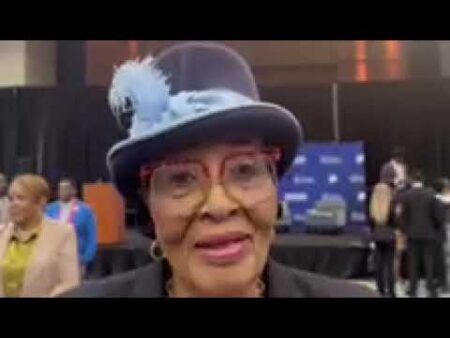It’s been three weeks since the U.S. Supreme Court’s leaked draft decision to overturn Roe v. Wade was made public.
Striking down the 1973 decision would end federal protection for abortion rights, opening the door for states to ban or restrict access to the procedure. A number of states have already passed measures that would outlaw or curtail abortion in the wake of the ruling. Since then, protests have stepped up around the nation and residents can’t help but wonder what the after will look like locally and regionally if the landmark decision is overturned this summer.
Advertisement
“Feminism failed to show up for voting rights and feminism failed to show up for candidates of color who talked about reproduction, so now here we are with mainstream feminism facing its worst fears because it wasn’t showing up for any of the other fights that might have prevented this,” said Mikki Kendall, author of “Hood Feminism: Notes from the Women That a Movement Forgot” — a book that centers feminism in a community-based activism lens.
On Mother’s Day weekend, we talked with Nadine Naber and Souzan Naser, co-directors of MAMAS (Mamas Activating Movements for Abolition and Solidarity), a Chicago-based collective that works with mothers/caretakers of color impacted by violence, surveillance and deportation by law enforcement.
Advertisement
Rosemary Cade, 67, joined MAMAS for the camaraderie. The Roseland resident is mother to Antonio Porter, who is serving a 71-year sentence for a 2002 murder conviction stemming from a dice game slaying. Cade spoke about her son’s story at a rally Mother’s Day weekend. She said being in community with other mothers offers comfort.
“There’s other mothers suffering and struggling with the same situation that I’m going through with my son — that’s a lot of stress,” Cade said. “The fight is the struggle. We got to keep fighting. We can’t give up.”
Established in 2019, the collective sees police violence as a feminist issue, where prisons are impacting their children and by extension impacting them. MAMAS seeks to integrate mother’s voices into social movements. Naber, University of Illinois at Chicago professor of gender and women’s studies and global Asian studies and faculty founder of UIC’s Arab American Cultural Center, and Naser, licensed clinical social worker, counselor and assistant professor at Moraine Valley Community College and Arab American Action Network president, spoke about the intersectionality of feminism, reproductive justice (reproductive rights, access, and social justice) and the upcoming decision on Roe v. Wade.
“For women of color, the fight for Roe vs. Wade has to be accompanied by the fight for all women to have access to health care and for all women to have the capacity to have or not have kids and to mother in safety and dignity,” Naber said. “Our issue is that no matter what argument you make for the right to choose, it’s still not going to be enough if people don’t have health care and people aren’t protected from state violence.”
Naber said MAMAS wants to make sure that mothers of color have a seat at the table in movements of change.
“We’re working with mamas who are resisting immigration bans, mothers who are surviving war and colonization,” Naser said. “We need to take seriously the ways prisons impact people of color, not just in the U.S., but colonized people across the globe, including Palestine. We need to talk about how prison, colonization, immigration bans and detention devastates mothers and caretakers economically. It impacts their physical and mental health. It interferes with their ability to survive, and to thrive with dignity. Mothers and caretakers bear all of these burdens when they are supporting their incarcerated family members, when they’re resisting war and colonization.”
The interview has been condensed and edited for clarity.
Q: What are the collective’s thoughts about the draft decision news?
Advertisement
Naber: Fighting for the right to choose — it couldn’t be more urgent. We’re very critical of how society is grappling with this moment, that our society is grappling with it in white, middle class, feminist terms. Those terms exclude the realities that women of color face and how they would be impacted. Reproductive justice is about the human right to parent your child. If you were to have a child and then the state forcibly separates mothers from their children, which very much disproportionately affects women of color, who, whether they’re immigrants, undocumented refugees, that trauma is reproduced generationally. For us, it’s the police violence issue of the Chicago Police Department, either killing children and forcibly separating mothers from their children and Chicago police incarcerating Black and brown men en masse, as well as the Chicago Police Department forcing confessions en masse. The question is: Who’s going to address these communities and these mothers who are facing a massively urgent reproductive justice issue that’s beyond a right under the law to choose whether to have a child or not? It’s about a state taking away your capacity to be a mother to your child.
Naser: It goes back to who has access and who is this ban going to impact the most. It’s going to impact minority individuals and marginalized communities because the white middle-class folk are still going to be able to carry on as normal. They have the money, they have the ability to get their health care needs.
Naber: Controlling women’s bodies has always been essential to white supremacy — we know that from the history of enslavement and Native American genocide. The hetero-patriarchal family, conservative concepts of women’s respectability, the white middle-class family must maintain itself if white supremacy, white privilege, and capitalism are to remain, which is what the U.S. is based on.
Q: If the mainstream is single-issue feminism, do people of color have to create their own form of feminism to be included?
Naber: Movements are often single issue. In our case, it’s about sexism and racism. It’s intersectional and that’s why we have to create our own because we need a space that can work on both at the same time — it’s gender and race together. It’s the mothering and the police violence. There are many movements like ours, but all of those groups are similarly on the margins … other groups of people doing the intersectional framing but maybe they’re just not as known.
Naser: When we think about the women’s rights movement, it was initially led by middle-class white women who didn’t include, prioritize or vocalize, or stand up for the needs of women of color and other marginalized women who have historically and continue to have limited access to health care, who have a lack of choices for effective birth control. Just think about the different ways that reproductive injustices are maintained — BIPOC mothers and caregivers continue to be dehumanized for social problems. One of our mothers talked about how she’s treated when she used to be able to go in person and visit her incarcerated son, how racist and sexist that process is during prison visits for her or in the courtroom and how corporate media blames mothers of color for their children’s death, or for their incarceration. Reproductive injustices include all of this.
Advertisement
Q: Is there a way to make more people drink the inclusive feminism Kool-Aid?
Naber: Mainstream discussion says that if we really want women to have autonomy over their bodies, then they should get these rights under the law. We’re saying that’s not enough. If we really want women of color to be included in this, we need to say that women should get to choose to have or to not have a child. Some people don’t even get the choice to have and after you have, you should be able to parent, to mother your child in safety and dignity. That’s a women of color framework on it; to be able to raise your kids in sustainable communities with dignity and safety and to not have to fear that your child is going to die or be taken from you. To drink the Kool-Aid, we need to couple the fight for Roe v. Wade with multiple fights at the same time — that’s what makes it a women of color perspective, that it always has multiple asks and multiple struggles. That’s what’s hard for the mainstream to understand, they want the one thing, but women of color feminism is never one thing, because if we’re talking about housing, we need housing and child care.
Naser: If they continue to chip away at people’s “rights” what’s to say that they’re not going to restrict individuals from being able to go out of state to get medication that they need, the health care that they need, the abortion that they need?







